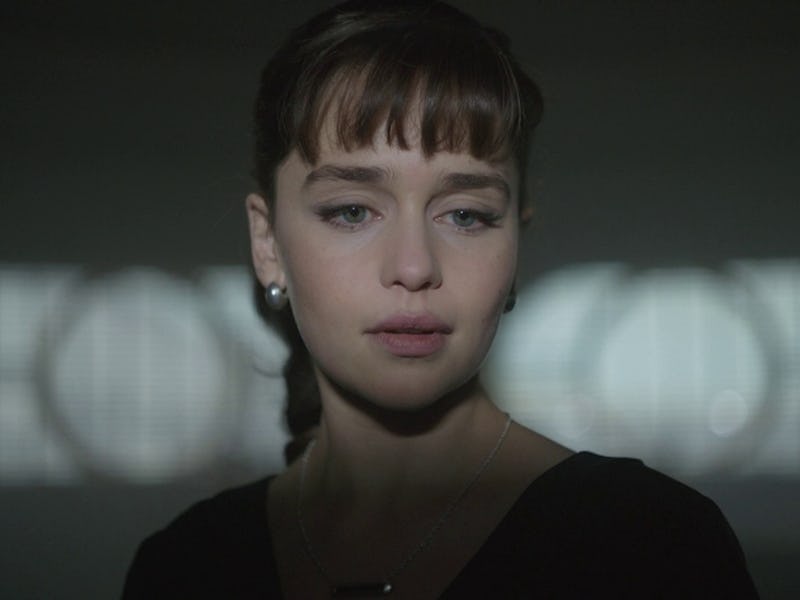How Solo Failed Its Female Leads
If anyone deserves a second chance, it’s Solo’s underrated supporting cast.

Lucasfilm had been trying to explore Han Solo’s origins for almost 15 years. But even when the project that became Solo: A Star Wars Story was announced in 2015, it was still the victim of bad timing. Lucasfilm initially tapped Phil Lord and Christopher Miller, the directing duo behind 21 Jump Street and The LEGO Movie, to direct Solo. But behind-the-scenes troubles quickly pushed the project from an obligatory (yet promising) prequel into a salvage job. Longtime friend of Lucasfilm Ron Howard stepped in to steer the ship back on course, and while the end product skews as close to the original spirit of Star Wars as possible, it barely cleared the bar of its production costs, making it the first box office flop in Star Wars history.
Solo was meant to open the door for a series of character-centric prequel films, but all that changed after the film’s disappointing box office performance. Since the release of the sequel trilogy, Star Wars pivoted completely from films and began building out its streaming empire. Star Wars stories about Boba Fett and Obi-Wan Kenobi became “event series” on Disney+, and Solo has scarcely been mentioned since — unless it’s being used as an example of what Lucasfilm shouldn’t be doing.
Lando wasn’t the only character that Lucasfilm abandoned after Solo.
The studio’s heel-turn was surprising and more than a little insulting, especially when you consider Solo’s merits. The film obviously wasn’t perfect, but it still introduced some interesting, exciting characters, each of whom could have carried spinoffs of their own. I’m not only referring to Donald Glover’s Lando Calrissian (who may yet get his own series one day), but also the group of powerful, complicated women that round out the supporting cast. Alden Ehrenreich’s title character is shaped by characters like Qi’ra (Emilia Clarke), Enfys Nest (Erin Kellyman), Val (Thandiwe Newton), and L3-37 (voiced by Phoebe Waller-Bridge). In a way, that’s a franchise first: Star Wars stories are typically dominated by male characters, save for one token, spunky female warrior. And that’s to say nothing of the male gaze that undermines those characters at every turn.
The women of Solo had complex inner lives and singular, even selfish, motivations. Unfortunately, Solo’s unwieldy production kept each of them from reaching their full potential. And that means that now, even five years on, they’re still gathering dust on the sidelines.
Val’s fate is one of the biggest mistakes Star Wars has ever made.
As groundbreaking as Solo’s female characters are in the grand scheme, they still suffer under the franchise’s worst practices. Newton made Star Wars history as Val, the first Black woman to play ... well, a Black human woman in a substantial role. Val was the brains of a gang led by Tobias Beckett (Woody Harrelson), which Han (Ehrenreich) and Chewbacca (Joonas Suotamo) join in Solo’s first act. After a group of marauders derail the group’s dangerous train heist, Val makes a noble sacrifice to protect the rest of the crew. Not a great arc for the franchise’s first prominent Black female character — and it gets even worse with the knowledge that Val’s demise was once much more nebulous.
“In the script, she wasn’t killed,” Newton told Inverse in 2021. “It happened during filming. And it was much more just to do with the time we had to do the scenes. It’s much easier just to have me die than it is to have me fall into a vacuum of space so I can come back sometime.”
L3-37 was one of Star Wars’ strongest characters to date — and one of the franchise’s worst casualties.
L3-37 is another character that feels similarly stunted by the script. Her very existence is a challenge to one of the franchise’s least-explored topics: the question of droid sentience. L3 is on the front lines of the battle for droid rights. She’s an active, vocal character, and though she’s technically Lando’s droid, her autonomy is never in question. That is, until she’s killed in a raid-slash-revolt on Kessel. Lando and Qi’ra manage to transfer her consciousness (and her advanced navigational system) into the Millennium Falcon, where she lives on to this day.
On paper, it was a nice way of folding such an incredible character into the ongoing Star Wars legacy. But it’s also a choice that undermines her whole pursuit of freedom, saddling her with lifetime of servitude and effectively silencing her character, possibly forever.
Enfys Nest seemed like an instrumental part of the Rebellion — could she pop up in Andor?
Alternatively, Qi’ra and Enfys Nest are little more than archetypes — that may be why they click so well in the narrative. Their scant characterization fits right into the world of Star Wars, which has always been based more in plot than on personhood. Clarke and Kellyman both make a meal of their respective roles anyway, delivering weighty performances that each could have launched new Star Wars stories. But after Solo underperformed (and destroyed Lucasfilm’s dreams for more spinoffs), Qi’ra’s adventures went on in the pages of Marvel comics. Enfys, sadly, wasn’t so lucky. She hasn’t been seen since, despite her intriguing role in the Galactic Rebellion.
Though it’s been very quiet on the Solo front lately, Lucasfilm may eventually reconsider their decision. Star Wars had folded underused character back into the narrative before; sometimes it just takes a little while. There may yet be a chance for Qi’ra, Enfys, or even Val and L3 to return in some capacity. Let’s just hope it doesn’t take years for the studio to recognize the error of their ways.
This article was originally published on